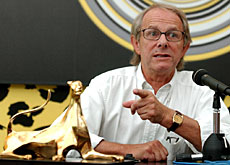
Locarno pays tribute to Ken Loach

This year’s Leopard of Honour at the Locarno film festival has been awarded to the British director, Ken Loach.
The official presentation was made in the Piazza Grande on Friday before a special screening of his 1993 film “Raining Stones”.
The 67-year-old became the first Briton to receive the prestigious award for a body of work that stretches back almost 40 years.
Loach has been a frequent visitor to Locarno.
He made his debut at the festival in 1972 when he won the Youth Jury Prize with “Family Affair” and since then he has shown five other films – all of them outside of competition.
At a news conference before the presentation, Loach expressed his gratitude for the support the festival has always given him.
“It’s a huge pleasure to come to Locarno again,” he said. “All of us who work on the films I’ve directed are deeply touched by the invitations to Locarno and we value the support of this festival.”
Voice of dissent
Loach is well known for his strong political beliefs and they have been reflected in all his television and film work.
His films deal with the underprivileged and marginalized within society and he has never flinched from proclaiming and promoting his belief in Socialism.
Indeed he says it has been an essential part in enabling him to make worthwhile and meaningful films.
“Without that basic political analysis you’re confronted with a series of events that you may have an impression of, but in the end make no sense,” he said.
“Without that kind of guiding star you can make any film or no film, and there has to be a kind of criterion to say this is important or that is important,” he added.
Loach’s political beliefs and his forthright and uncompromising stance do not seem to have affected his ability get projects off the ground and into the cinemas.
In a career spanning almost 40 years he has made 17 feature films – no mean feat in an industry where costs are rising exponentially and in which potential profits are often the gauge of a film’s chances of making it to the big screen.
But Loach believes he has profited from a Capitalist system that “prides” itself on allowing the occasional “voice of dissent”.
“We’ve taken advantage of the hypocrisy of a system that claims to be diverse and liberal and all-inclusive only so long as the dominant ideology is not under threat,” he said.
“If it is under threat then voices of dissent get suppressed whereas so long as it is confident, then we have to be allowed expression just to show what a broad, liberal tolerant society we live in.”
European cinema
Loach has never been tempted by the attractions of Hollywood and is a huge fan of what he sees as the rich cinematic heritage throughout Europe.
“The strength of European films is in their diversity,” he said. “They represent different cultures, languages, perceptions and different cinematographic traditions.”
“It’s brilliant, it’s fantastic, and that’s what we have to nourish,” he added.
But he is worried about the problem European films are having making it on to screens across the continent and he does not believe it is solely a problem of distribution.
Loach insists the solution lies in looking at who has ownership of the cinemas and says that even the best distributors are powerless if the cinema owners “close their doors”.
He cites the welcome experience of countries such as Norway, in which some local municipalities own a number of cinemas, and where people have a wider variety of films from which to choose.
But he maintains the situation in the majority of European countries can only improve if there is sufficient political will.
“The first thing that needs to be tackled is the ownership of the cinemas,” he said.
“They must have a programme that allows the audience access to the full breadth and diversity of world cinema and particularly European cinema,” he added.
“We have to put European films back into the European cinemas and I don’t think we can do that by just giving more money to the good distributors.”
swissinfo, Jonathan Summerton in Locarno
The first film Loach screened at Locarno – “Family Affair” in 1972 – won that year’s Youth Jury Prize.
Loach has shown five other films at Locarno – all of them outside of competition:
“Looks and Smiles” (1981), “Riff-Raff” (1991), “Raining Stones” (1993), “Land and Freedom” (1995) and “My Name is Joe” (1998).
He directed his first television drama in 1964 and two years later made the groundbreaking drama “Cathy Come Home”.
His debut feature film was “Poor Cow” in 1967, and in 1969 he directed the much-acclaimed “Kes”.
He has twice won the Jury Prize in Cannes – in 1990 for “Hidden Agenda” and in 1993 for “Raining Stones”.

In compliance with the JTI standards
More: SWI swissinfo.ch certified by the Journalism Trust Initiative


























You can find an overview of ongoing debates with our journalists here . Please join us!
If you want to start a conversation about a topic raised in this article or want to report factual errors, email us at english@swissinfo.ch.